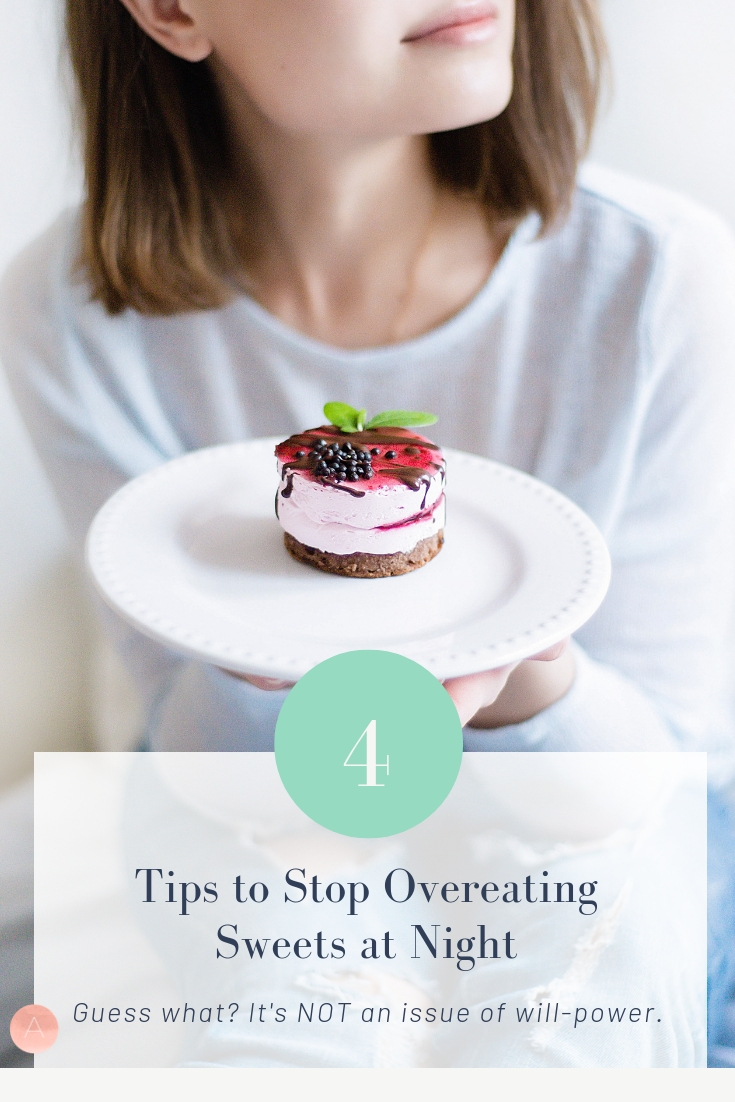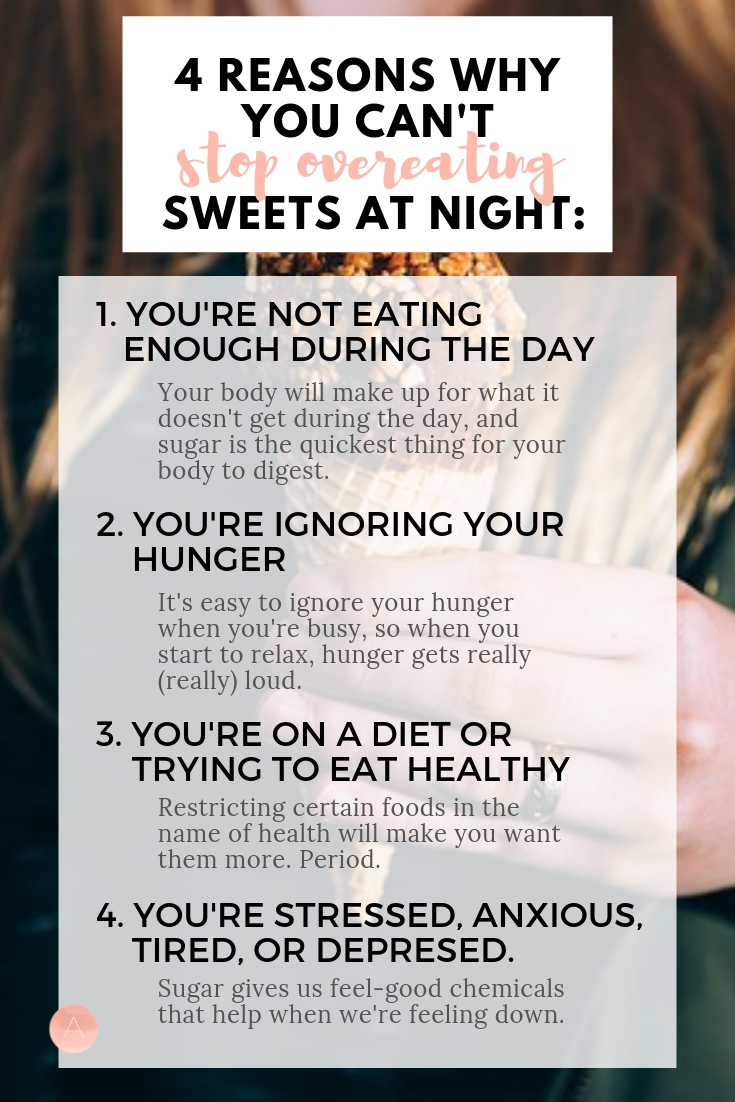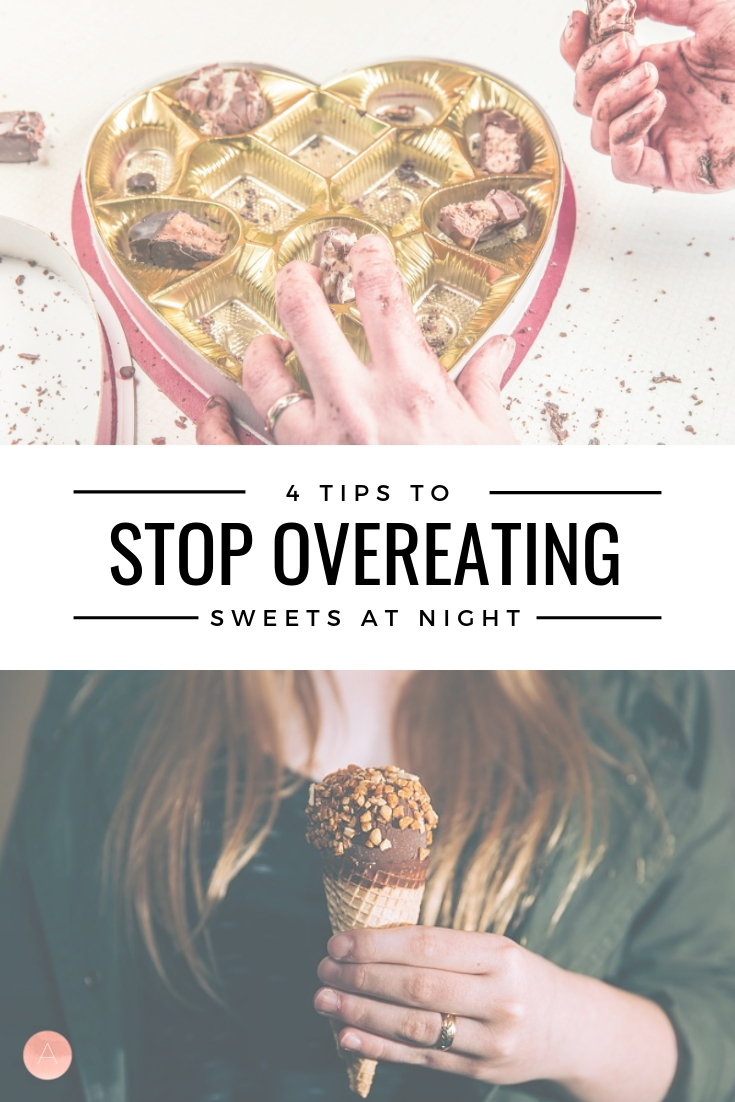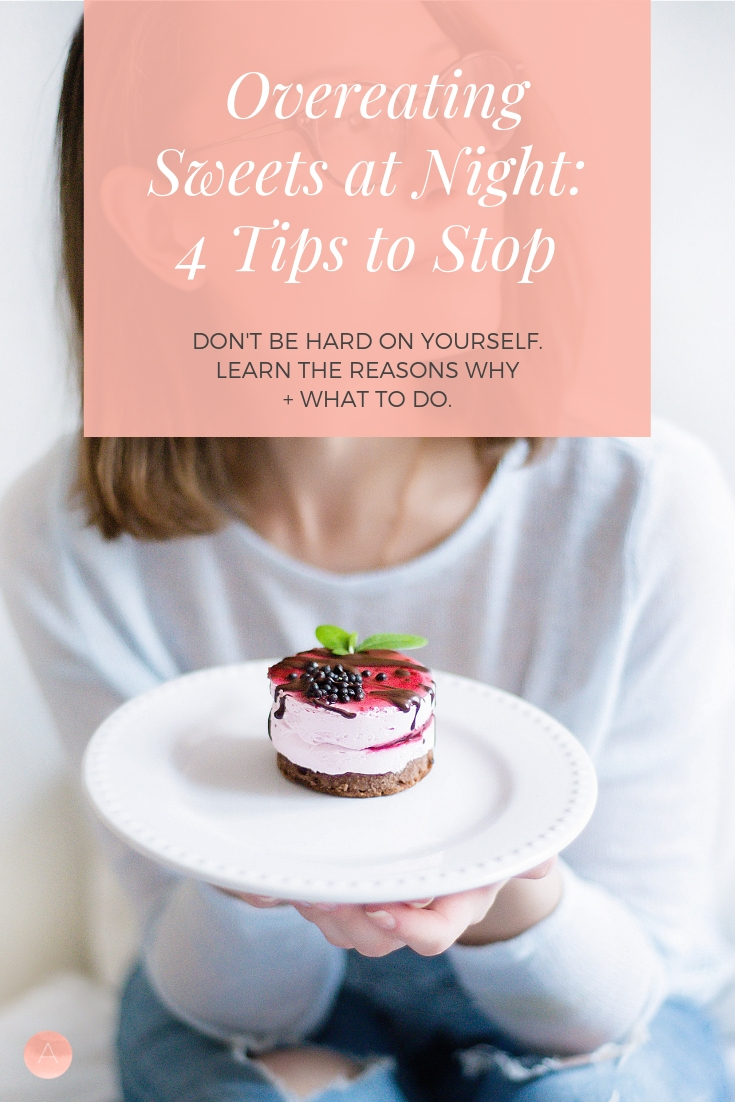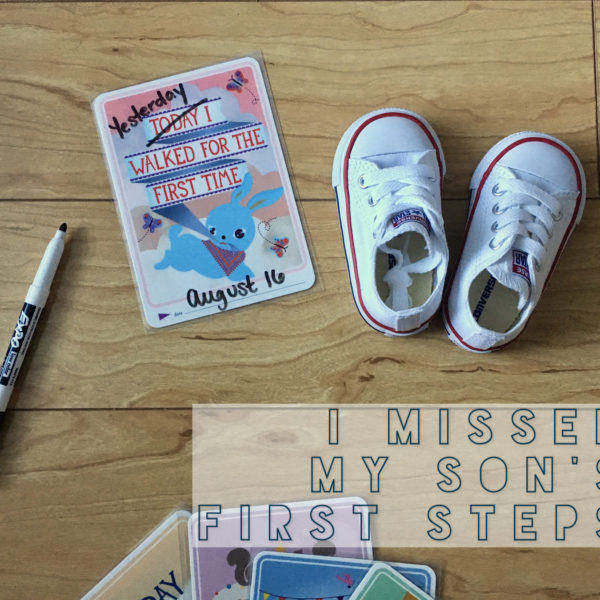Are you looking for ways to stop overeating sweets at night? Do you wonder why you tend to overeat at night or after work? In particular, do you find yourself wanting more sweets in the evenings?
You’re not alone. Men and women both report overeating sweets at night, and it’s nothing to blame yourself for.
While you may be aware of emotional eating for stress or anxiety, you may not know that night eating is also a big trigger for many. Here are four reasons why you may be struggling with overeating sweets at night:
Short on time? Enter your email to get these tips as a printable cheat sheet:

Read on for 4 reasons why you may be overeating sweets at night:
-
You’re not eating enough during the day.
Why?
By far, the number one reason many people feel out of control with overeating sweets at night is because they don’t eat enough during the day. Through 13+ years of working with a wide variety of people and going through their daily eating schedule, I’ve seen this to be true countless times.– Do you get too busy to eat during the day when you’re working?
– Do you forget to eat when you’re rushing around?
– Are you trying to lose weight?These 3 factors are largely a culprit for your overeating. When you’re busy, it can be easy to ignore your hunger signals. That’s why as soon as you have a minute to relax, your body will alert you that it’s definitely time to eat.
Late hunger is not gentle. It will often be very uncomfortable and distracting until you eat something.

Your body will likely want something sweet if it’s overly hungry, because sugar is the quickest form of energy. A body that’s been deprived of food all day is low on energy (because calories = energy), so naturally it will be looking for some. And fast. When you eat fast, you’re likely to overeat. That’s why ignoring your hunger all day creates the drive to overeat sweets at night (it’s quick energy).
What to do?
The #1 remedy to stop overeating sweets at night is to make sure you’re eating enough during the day.– You can work with a local dietitian (like us!) to do this.
– You can also take time to check in with your body during the day to see if it’s hungry. Every few hours, take a minute to pause and rank your hunger. You don’t have to follow a specific diet or strict meal plan. Your body will often be a good source to let you know how much or when to eat, you just need to take a moment to listen to it.Enter your info below to get these tips as a printable cheat sheet.
-
You’re ignoring your hunger.
Why?
In many ways, this goes back to the first point above, but there are other reasons you may be ignoring your hunger.– You may have heard some rules about when you “should” or “shouldn’t” eat.
– You may have heard some ideas about what’s “good” or “bad” for you.
– You may think that if you’ve recently had something to eat, then surely it can’t be time to eat again.
All of these factors can make you ignore your hunger, because they’re based on something outside of yourself. You’re not allowing your body to tell you what you need but rather trying to put your hunger in a box based on what you’ve heard. And ignoring your hunger is almost a sure-fire way to find yourself overeating sweets at night.
A lot (if not most) of what you’ve heard about how to eat “healthy” isn’t true. Much of the popular advice for healthy eating is based on diets that don’t satisfy you, leaving you ravenous and with intense craving.
So, you ignore your hunger because you think that it’s either not time to eat, it’s a “bad” time to eat based on weight loss goals or health, and/or the only thing available isn’t good for you. And remember, you may also be ignoring your hunger because you’re just too busy to listen to it.
What to do?
– Check in with your hunger during the day. Set alarms on your phone for every few hours reminding you to ask yourself if you’re hungry.
– Eat something versus nothing. If you’re hungry, you’re almost always better off to eat something (even if you don’t feel like it’s healthy) instead of nothing. Warning: This does not follow mainstream diet advice. But you’re pretty much guaranteed to eat too much later if you ignore it now. Hunger grows, and so will your meal size. -
You’re on a diet or trying to eat healthy.
Why?
You’re much more likely to find yourself overeating sweets at night if you’re on a diet or following a meal plan, because you’re likely being told ideas about what to eat, how much to eat, and when to eat it. And there aren’t many diets that include sweets on the menu.
When you’re deprived of either a basic nutrition need (carbs) or something you enjoy (sweets), you’re much more likely to want it.
So, if you’re on a diet that’s limiting you of something you truly need or just emotionally want, you’re pretty much setting yourself up to overeat sweets. And this usually happens at night because we’re tired of fighting it all day long.
What to do?
– Regularly include your favorite treats. There is so much evidence out there on this, but to put it simply, you’ll want something less the more it’s around. So, you’ll be a lot less likely to overeat something if you have had it recently and know it’s coming again. Decide how often a portion of your favorite treat will keep you satisfied, and you’ll be surprised at how much easier it is to not fight the urge to binge on it.
– Make peace with food. Learn to see all foods as equal and acceptable. By reducing the importance you give some foods, you’ll naturally reduce the desires for certain foods. You’ll also be able to make eating decisions based on what your body needs instead of just what it wants.
– Pick up a copy of Intuitive Eating. Whether it’s the book, audiobook or podcasts, learning the Intuitive Eating concepts can do a total makeover on your relationship with food (and your body). -
You’re stressed, anxious, tired, or depressed.
Why?
It’s natural to want sweets for comfort when you’re feeling bad. Some people may want other foods that are either savory or salty, but sweets are a predominant craving for many.
Remember, sugar is the quickest form of energy for your body. So if you’re tired or down and need a pick-me-up, you’ll naturally turn to sugar, thus finding yourself overeating sweets at night. This isn’t an issue of willpower, but rather an issue of biology. Don’t feel bad about it. Just learn your triggers and try to work on the source. For example, if you notice you want chocolate mostly at night when you’re tired, try to get to bed earlier.
Sweets also give us pleasure. If you’re feeling anxious, nervous or stressed, then you’re likely looking for relief, and sugar can give that to you. The issue here is that it’s only short-term pleasure, so you find yourself eating more to avoid the feelings.
What to do?
– Find ways to handle emotions without food. Consider working with a counselor or therapist to talk about emotional health.
– Try de-stressing by taking a bath, going for a walk, calling a friend, or working on a hobby. Here’s a list of many things you can do besides eat.
– Learn to make peace with emotions. Humans are emotional creatures and often working hard to escape difficult feelings. Give your feelings some space to be let out instead of using food to numb them. (For this, I defer to working with a mental health professional.)One of the best ways you can stop this habit is to make sure you’re eating enough and that you aren’t cutting back too much while trying to eat healthy or lose weight. Use our meal planning guide to make sure you’re setting yourself up for success.
Hopefully this article gave you some tips on how to stop overeating sweets at night and has helped you understand why you feel frustrated with these urges. This list is by no means all-inclusive. There are many reasons why we overeat, eat at night, and eat sweets, and this article is not a substitute for professional help.
As someone who used to deal with this myself, I just hope it got your wheels turning, helped you find some grace for yourself, and gives you some ideas about practical ways you can find more peace and enjoyment with eating.
Passionately,
Alyssa
*The term overeating here points more to the feeling you have from eating. “Overeating” is different for everyone and isn’t just what you think a portion should be. It’s more about the feeling when you eat that’s to the point of discomfort, physically or mentally.
Don’t forget to save these tips as a printable cheat sheet!
// Want to save this for later? Pin it to your favorite board for easy reference.
